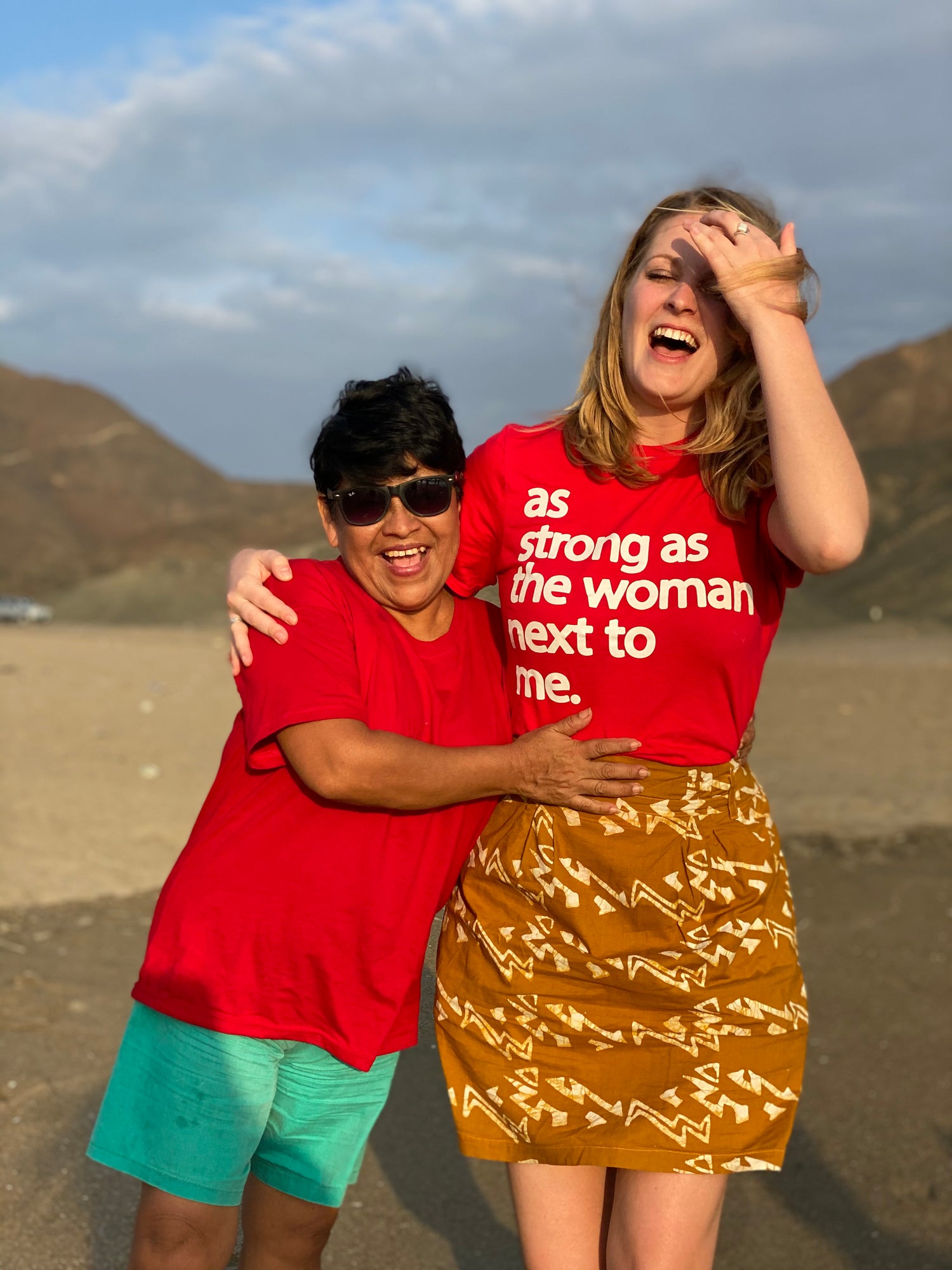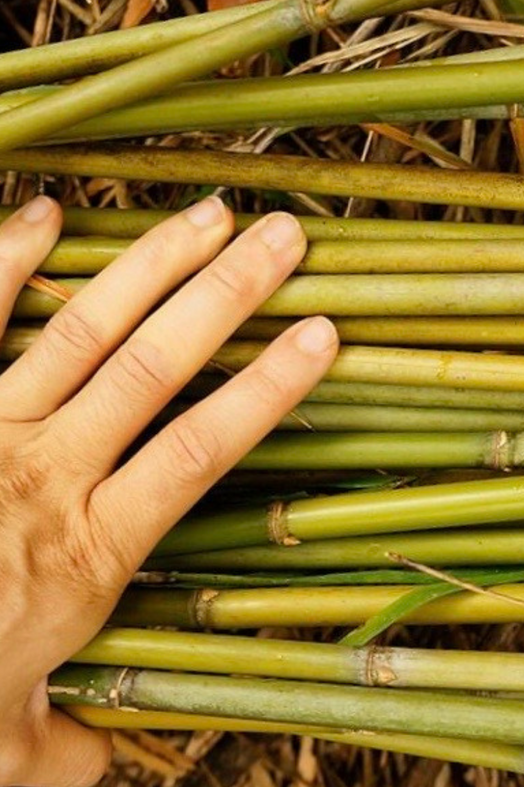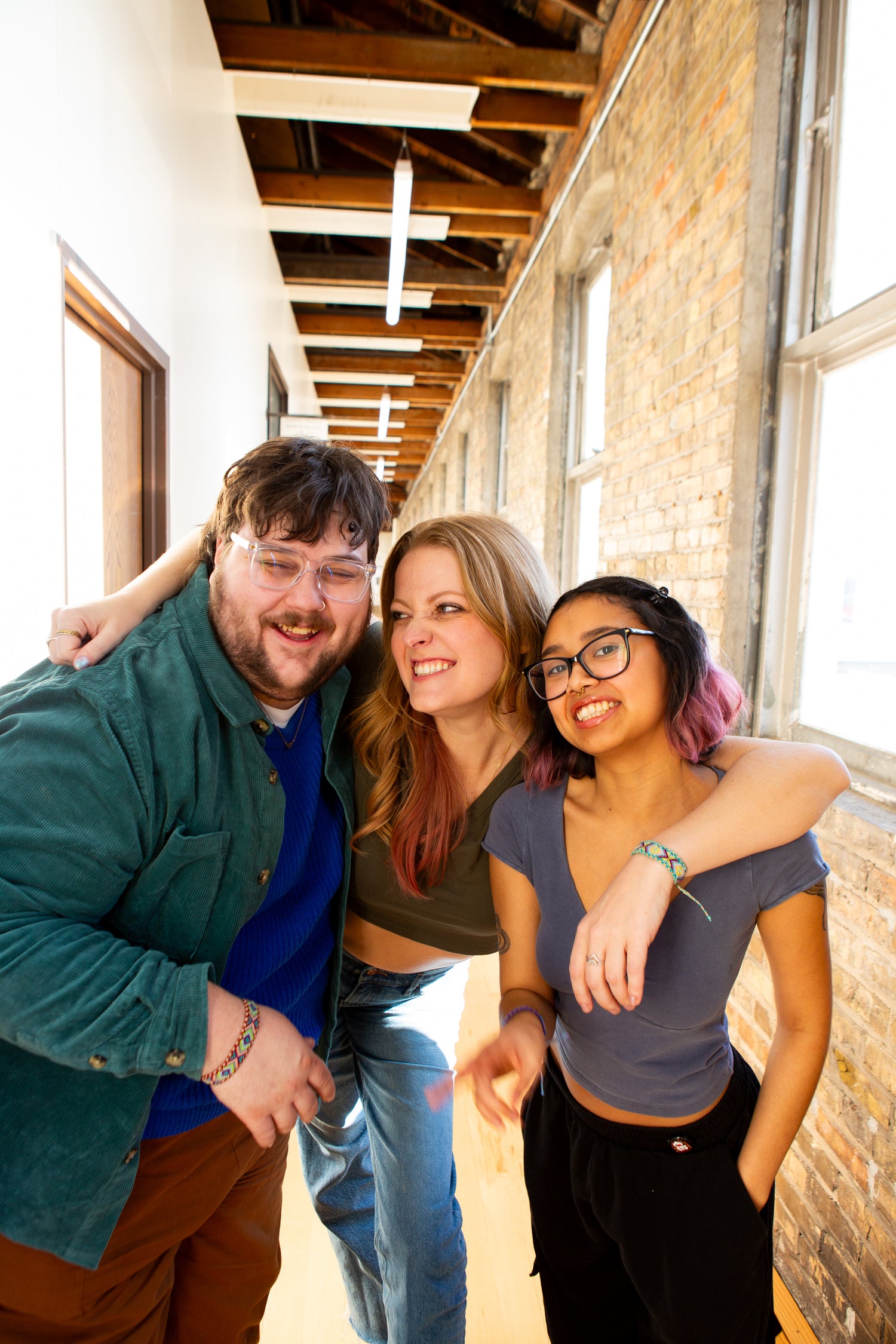
Here at Fair Anita, we use three main values to guide us in creating a world where women feel safe, valued, and respected -- no matter their geography. We are building a business in the most ethical way we can dream up!

"Courageously choose to challenge the status quo by unequivocally standing for your values". ~ Joy McBrien, Fair Anita Founder + CEO
EQUITABLE
Fair Anita works to create a more equitable world. We strive for this not only in creating equitable partnerships with talented artisans worldwide, but also in working with our local communities.Did you know that economic insecurity is the #1 reason women stay in abusive relationships.? Fair Anita partners with survivors of sexual/domestic abuse who utilize their skills to create economic self-sufficiency for themselves.
Collapsible content
Here’s how we build equitable relationships:
1) Global Partnerships
We are proud to partner with over 8,000+ changemaking women around the world who skillfully handcraft our designs.
2) Living Wage
Each of our artisan partners earns a living wage that is 2-4x the minimum wage plus health insurance and educational scholarships.
3) Local Leaders
Our artisan partners work for cooperatives that are facilitated by local leaders because we recognize that they know what is best for their communities.
4) Safe Working Conditions
Each of our 19 partner cooperatives provides safe working conditions. Many of our artisan partners are able to work from home, which allows for greater flexibility, and those that work at a workshop frequently receive free child care, typically on-site.
While each workshop is different, overall safe working conditions include lots of light and spaces that are well ventilated with easy access to exits in case of an emergency. All equipment is safe-to-use and kept up-to-date. Safe working conditions also include proper protective equipment, such as goggles, gloves, and aprons.
5) Consent in Storytelling
Along with producing products equitably, we recognize the power dynamics between “buyers” and “producers” in the supply chain. Though our products are made by kick-butt women around the world, we don't always talk about them a ton because we believe it is important to respect them and their privacy, just the way we would want people to respect ours. We believe consent in storytelling is essential, this is why we only share stories of women who have given us their full permission to talk about how awesome they are!
6) Skills and Talent Development
We focus on promoting skill and talent development. We work with our artisan partners to increase their competencies, allowing their businesses to grow and enabling them to hire more women. By investing in design skills, business acumen, and pricing strategies, we're facilitating women to be leaders in their communities on national and international levels.
7) Fighting Inequality at Home
Fair Anita is based in the Twin Cities, and we know it is vital to support our local community as well. In the pre-COVID world, we hosted workshops on equality and diversity, and can’t wait to get back at it when we can meet up in person again. We also donate resources to local organizations. (To learn more, read our last annual report)

Our goal is upwards of 80% of our product contents made from recycled materials.
SUSTAINABLE
Building long-term sustainable relationships with our artisan partners is at the core of what we do. Additionally,because we only have one planet, and we can’t keep on making new products from new resources forever. We know that creating a sustainable organization isn’t super easy when you are in the business of making things, and over the last few years, we have learned a lot!
Collapsible content
How we practice sustainability:
1) Sourcing Sustainable Materials
We source all of our materials in communities that are local to where our products are made. This stimulates the local economy and gives us a fun challenge to figure out how to work with recycled materials.
While we don't have an exact percentage yet, we know that a majority of our products are made from recycled materials, like recycled metal, upcycled leather, or factory seconds. When we can’t source recycled materials, we like to use eco-friendly products, such as our organic cotton bags and tees. Our goal is to see upwards of 80% of our product materials made from recycled materials.
2) Packaging + Shipping
We are improving all processes to become more environmentally friendly, especially our packaging and shipping. We’ve been working to create biodegradable/compostable transparent bags for shipping (as many countries require individual packaging for export), and we aim to have this task completed in 2021.
When we ship you items from our warehouse, we use mainly reused packages that our team members and customers bring in. If you live in the Minneapolis, MN area, you can help us out by bringing used shipping boxes + bubble mailers to our headquarters: email info@fairanita.com for more information.
3) Carbon Offset Programs
Because we work with women all over the world, all of our products are typically flown into the U.S. This produces a lot of carbon. However, we are working with our partners to sequester carbon.
Recently, a report was released that shared where trees needed to be planted to reverse the effects of climate change. Many of our partners live in these areas of the world, so we work directly with our partnering cooperatives. To offset our carbon footprint, we participate in funding and supporting the planting of trees in their communities. Learn more about how we offset our carbon footprint.
4) Long Term Relationships with Artisan Cooperatives
We also value sustainable + long-term relationships with our global artisan partners. These are vital to building better and more ethical supply chains. Continued + consistent orders make it possible to maintain these long-term relationships. If we can’t sustain these partnerships, then we aren’t doing our job.

“Do the best you can until you know better. Once you know better, do better.” ~ Maya Angelou
EVOLVING
Fair Anita is definitely not perfect, but we are trying to build the most ethical and sustainable business we can possibly dream up.As we learn more and engage with the world around us, we constantly adapt how we do business. Ensuring women feel safe, respected, and valued no matter their geography will always be the core of what we do. But, how we do that and how we talk about it may change over time. That’s okay; it’s how we believe business should be done.
Collapsible content
How we are evolving:
We are not stagnant, we are evolving to be the most equitable + sustainable business we can be. Here are two areas of our business we are working to improve.
1) Grow the Ethical + Sustainable Fashion Movement
One of our long-term goals is to no longer be relevant. Yup, we want ALL fashion to be sustainable so we no longer are special.
And y'all are doing your part to help us in that mission! From our retail survey respondents in 2020, 65% reported that they purchased from us as a substitute good, meaning that they chose our mission-based product over other options.
While 27% of survey respondents purchased Fair Anita products as an act of philanthropic giving, meaning they potentially purchased the product solely because of the associated mission.
We love this! When more we people switch over to buying ethical goods rather than fast fashion in their everyday life, that means we are challenging the norms of the fashion industry, and that is pretty cool.
2) Anti-Racist + Anti-Colonialism
We are PROUD members of the Fair Trade Federation, meaning an outside governing board has verified our work as meeting all the fair trade principles.
However, we know that fair trade has a whiteness problem that is rooted in colonialism and the white savior complex. We aim to be an anti-racist organization, and we understand that this is a constantly evolving process, requiring a lot of hard work and learning.
To address this, we are working to facilitate conversations about the whiteness in our broader fair trade community through the JEDI (Justice Equity Diversity Inclusion) Committee with the Fair Trade Federation. Read our blog Fair Trade has a Whiteness Problem for more info on our anti-racism work.
So, why are these our values?
Learn more about how it all got started here.
